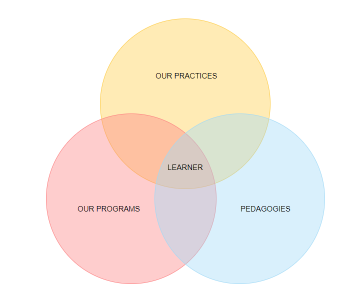Building Partnership for Learning
In embracing 21st Century learning, awareness and participation of all parties in relation to the learning outcomes of learners are crucial. For parents, the challenge is connecting their aspirations for their children to their learning activities in schools. For teachers, the challenge is engaging students and parents in ways that connect them to real world experiences. For children, the opportunity is to experience the sophistication of 21st century learning and teaching in an environment that foregrounds fun and childhood instead of testing and assessment.

A Framework for Learning
Our framework for learning focuses on both the integration and innovation in curriculum and teaching practice necessary to lead learning in the 21st Century alongside those fundamental partnerships between learners, parents and families, and school, grounded and aligned in communication, consistency, and collaboration.
The Sweet Spot
Contrary to the belief that a fully inquiry led learning model would deliver the greatest gains in learning McKinsey with the OECD have identified that the sweet spot for depth of learning sits with 2/3 explicit and direct instruction supplemented by 1/3 inquiry based learning activities. At ALFA our approach already embodies these practices delivering identifiable gains in young learners knowledge skills and behaviours.

Integrated STEM with Hands-on Activities
We develop a framework for learning recontextualised the emergent integrated focus on STEM/STEAM/STREAM perspectives into a holistic discipline/practice/pedagogy model that establishes measurable intersections between capabilities, learners, challenges, and societally deliverable outcomes.

Our Pedagogies for Teaching and Learning
21st century pedagogies involve teaching approaches and strategies that connect learners collaboratively, creatively, communicatively, and critically while developing their social responsibilities through character and citizenship.
Examining all programmatic interactions from diverse perspectives enables our programs to flexibly support teachers as they move from more direct/explicit instructional models to more open inquiry and child centred approaches.
The early years classroom delivers learning and teaching experiences grounded in fun hands on activities. Elaborating 21st century pedagogies through play, gaming, narrative, exploration etc connects the essence of childhood invisibly and explicitly to the intentions of learning.
Thinking deeply about the connections between activity, engagement, and learning allows us to seamlessly blend positive experiences with specific intentions and interventions.
Our Practices for Learning
Understanding and respecting the context of the individual provides a basis for situating their learning appropriately. Developing from this foundational understanding grounded in values and identity provides a way of linking the thinking skills across the dimensions as identified relevant to the 21st century. Supporting learning through the toolset lens of design thinking through project approach provides a basis to ground cultural and values relevance and sensitivity in the perspectives of challenge based thinking around global issues.
Explicit focus on 21st century practices provides a direct connection between learning experiences in the classroom and real world problem solving.
Critical Thinking
Critical thinking refers to the process of actively analyzing, synthesizing, evaluating and reflecting on information gathered from observation, experience, or communication. It is thinking in a clear, logical, reasoned, and reflective manner to solve problems or make decisions.
Creative Thinking
Creative thinking is a way of looking at problems or situations from a fresh perspective that suggests new or original solutions. It can be stimulated both by an unstructured process such as brainstorming, and by a structured process such as lateral thinking.
Collaborative Thinking
Collaborative thinking skill happens when children work together to analyse, inference, evaluate, ask questions and discuss.
Communicative Thinking
Communicative thinking is the ability to express meaning through reasoning, connecting, and representing.
Character
Character building is nurturing good attitudes and behaviors in a child’s character.
Citizenship
Citizenship education instill in children the values, attitudes and behaviours that support responsible global citizenship.
Project Approach
Project Approach is a child-centred, child-initiated investigation teaching approach. The children are actively engaged in investigation and applying knowledge and skills, making decisions and choices on all aspects of their work.
Learn MoreProject Based Learning
Project Based Learning is a teaching approach in which children gain knowledge and skills by working for an extended period of time to investigate and respond to an authentic, engaging, and complex question, problem, or challenge.
Problem Based Learning
Problem based learning is child-centred approach in which children apply their knowledge from different disciplines to solve a specific problem. The process allows the children to develop desirable skills and attitudes.
Design Thinking Process
Design Thinking is a design methodology that provides a solution-based approach to solving problems. The five stages of Design Thinking are Empathise, Define (the problem), Ideate, Prototype, and Test.
Cultural Values
Understanding the custom (traditions and rituals), beliefs and values of a group of people.
Religious Perspectives
Understanding the beliefs, behaviours and practices of different faith or religions.
Identity
Understanding who a person or a group is and what makes him or them different from others.
Our Programs for Learning
Our programs are developed from the perspective that learning intentions should guide curriculum, instruction, and assessment. Using principles of backward design we incorporate deep interdisciplinary integration supporting multiple forms of engagement, representation, and action. Grounded in teacher observations and judgements our program structures and tools support deepening an understanding of the diversity and depth of learning.

